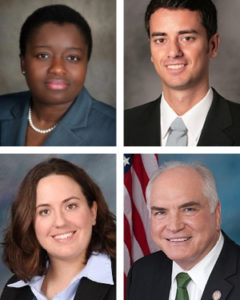The Center for Business and Economics at Allegheny College will hold its 11th Annual Zingale Big Idea Competition April 27–28 in Quigley Hall on the Allegheny campus. The contest emulates the experiences seen on the popular CNBC broadcast “Shark Tank.” The public is invited to attend the final round of presentations on Saturday, April 28, from 9 a.m. to 3 p.m.
 Students will present entrepreneurial concepts with the chance to receive funding through cash prizes. The ideas must fit into one of four areas: For-profit Business, Not-for-profit Social Venture, Research Project, or Community Engagement Initiative. Students work in teams and design 20-minute presentations for their ideas, which they present at the competition.
Students will present entrepreneurial concepts with the chance to receive funding through cash prizes. The ideas must fit into one of four areas: For-profit Business, Not-for-profit Social Venture, Research Project, or Community Engagement Initiative. Students work in teams and design 20-minute presentations for their ideas, which they present at the competition.
The first-place team will receive a $5,000 cash prize. In total, $10,000 in prizes and trophies will be awarded, with the first-, second- and third-place teams receiving trophies, monetary prizes and honorable mentions.
Some students have re-purposed their Junior Seminar or Senior Comp projects, or have taken the Economics of Entrepreneurship II class, to prepare for this competition. This year, there are 25 teams of one to three students each. Five of the teams are from Grove City College; the remaining 20 consist of Allegheny students.
The competition was renamed last year in honor of 1977 Allegheny graduate Lance Zingale and his wife, Karen. In November, the Zingales made a gift to establish a $500,000 endowed fund supporting the Center for Business and Economics. Lance Zingale has served as a judge at the competition for the last four years and is a member of the center’s Board of Visitors.
This year’s competition will be judged by a panel of two Allegheny faculty and 12 accomplished professionals, 11 of whom are Allegheny alumni. Among those are Zingale and 2017 Allegheny graduate Liana Leja, the first-place award winner in last year’s competition. Her “Care Van” proposal improved access to medical care in the Meadville community while reducing costs and improving operational efficiencies.
Entrepreneur in Residence Chris Allison and Sarah Holt are co-coordinators of the Big Idea competition. Allison says that the competition challenges students to step outside their comfort zones and develop creative solutions that address a need.
“Students participating in the competition are expected to do their homework,” Allison says. “They thoroughly research the marketplace, find a niche where they can make a difference, polish their presentation and make the pitch to executives. It’s a demanding but rewarding experience for them, and we are excited to hear this year’s big ideas.”






